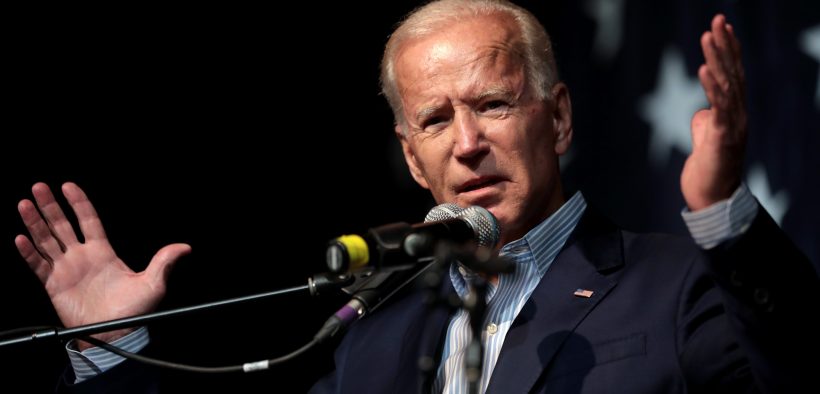Biden Reverses Stance On Super PACs as Campaign Funding Lags

Despite previously condemning Super PACs and declaring he would refuse their funding, Biden reversed course on Thursday opening the door to the controversial campaign finance groups.
Joe Biden came under fire in June for telling a room of wealthy Wall Street donors that “nothing would fundamentally change” under a Biden administration. After opening the doors to super PAC funding for his campaign on Thursday, reversing his previous stance of rejecting the unregulated finance committees, critics are concerned his comment about nothing changing in American politics under his leadership holds new merit.
Super PACS were enabled after the 2010 Citizens United Supreme Court decision which deemed corporate expenditure limits unconstitutional and ruled that unlimited funds could be raised for candidates, so long as they aren’t directly given to a supported candidate’s official campaign. Super PACS are widely criticized for making America’s election system further dependent on the whims of the super rich, who circumvent campaign finance limits with the shadowy political action committees.
Biden has struggled to gain grassroots support, unlike his top rivals Sen. Elizabeth Warren and Sen. Bernie Sanders, who have outcompeted him in fundraising despite shunning big-money fundraisers. As Politico notes, Biden “finished September with only $9 million in his campaign account — far less than the reserves built by Pete Buttigieg ($23.4 million), Elizabeth Warren ($25.7 million) and Bernie Sanders ($33.7 million).”
The Biden campaign issued a statement on its decision, Thursday, pledging to change campaign financing laws later:
“Until we have these badly needed reforms, we will see more than a billion dollars in spending by Trump and his allies to re-elect this corrupt president,” said Kate Bedingfield, Biden’s deputy campaign manager, according to Politico.
“And let’s be clear: Donald Trump has decided that the general election has already begun,” Bedingfield said. “In this time of crisis in our politics, it is not surprising that those who are dedicated to defeating Donald Trump are organizing in every way permitted by current law to bring an end to his disastrous presidency. Nothing changes unless we defeat Donald Trump.”
The Intercept’s Lee Fang notes that longtime Biden supporter Larry Rasky, founder of lobbying firm Rasky Partners, is already working to begin the super PAC. Rasky Partners “is currently registered to lobby on behalf of Raytheon, Harvard Pilgrim Health Care, and the Republic of Azerbaijan.”
Steve Schale, a lobbyist who led the Obama-Biden campaign operation in Florida and is also involved in the effort, boasts a current client list “that includes the Florida Hospital Association, JetBlue Airways, State Farm Insurance, Walt Disney Parks, AT&T, and the Associated Industries of Florida,” writes Fang.
The Biden campaign has repeatedly condemned the corrosive nature of super PACs, as TJ Ducklo, a Biden spokesman, explained to the New York Times last month.
“The attacks aimed at this campaign from dark money groups helping Donald Trump spread his outlandish lies and slander have only served as a reminder of the urgent need for campaign finance reform,” Ducklo told the Times. “Which is exactly why since the beginning of this campaign, Biden for President has not and will not welcome the help of super PACs. That goes for those that purport to help him, despite his explicit condemnation of their existence.”
As the Intercept reported in April, Biden launched his campaign at the home of Comcast’s top lobbyist, with a long list of GOP donors and corporate lobbyists in attendance. While Biden’s campaign has worked to court special interests and his political action committee has accepted lobby funds, critics argue super PACs will open the floodgates of special interest funding and will oblige him to do their bidding if elected.
“It’s disappointing that any Democratic candidate would reverse course and endorse the use of unlimited contributions from the wealthy to run against fellow Democrats,” tweeted Elizabeth Warren on Friday. “A handful of wealthy donors should not be allowed to buy the Democratic nomination. That’s not who we are.”
“The Democratic primary should belong to grassroots supporters and grassroots donors, not the rich and powerful,” Warren continued. “Every Democratic candidate should agree: Super PACs have no place in our primary.”
Bernie Sanders’ campaign has also openly criticized the former Vice President’s reliance on wealthy donors: “Joe Biden is traveling around the country raising a lot of money for his campaign at fundraising events with billionaires, corporate lobbyists, and Wall Street executives,” wrote Sanders campaign manager Faiz Shakir in a fundraising email this summer.
In a 2018 interview with PBS, Joe Biden said he originally advised Bernie Sanders to refuse money from super PACs, because “people can’t possibly trust” politicians who accept money from the unregulated campaign financing vehicles.
“My positions are a hell of a lot closer to Elizabeth Warren and Bernie Sanders on some of the economic positions,” Biden said. “There isn’t – I sat with Bernie. I’m the guy that told him, you shouldn’t accept any money from a super PAC, because people can’t possibly trust you. How will a middle-class guy accept if you accept money?”
When asked about the Biden campaign’s flipped stance at a campaign rally last Thursday, Bernie Sanders joked that “Joe Biden didn’t have to convince me not to take a Super PAC,” before criticizing the American political system’s connection to super-rich donors, and reiterating that he would reverse the Citizens United decision if elected president.















